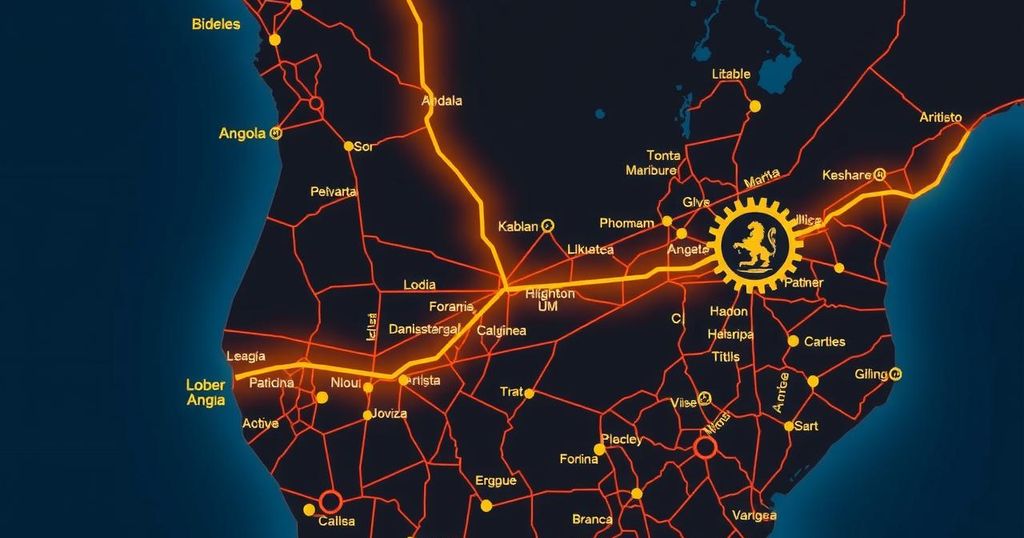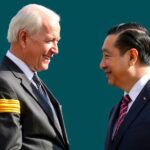Politics
AFRICA, AFRICA PROGRAMME, ALEX VINES, ANGOLA, ATLANTIC OCEAN, BBC, BID, BIDEN, CHATHAM HOUSE, DEMOCRATIC REPUBLIC OF CONGO, DEVELOPMENT, DONALD TRUMP, EUROPE/ASIA, INFRASTRUCTURE PROJECTS, INTERNATIONAL RELATIONS, INVESTMENT PROMOTION AUTHORITY, IPA, JOE BIDEN, LOBITO, REGIONAL DEVELOPMENT, RUSSIA, TRADE RELATIONS, WASHINGTON DC
Nia Simpson
Biden’s Historic Visit to Angola: Strengthening U.S. Trade and Infrastructure Efforts
President Joe Biden’s inaugural visit to Africa focuses on Angola, highlighting the Lobito Corridor project aimed at transporting vital minerals from the region to global markets, countering China’s influence. This visit signifies a crucial diplomatic shift and underscores Angola’s growing partnership with the U.S. while addressing potential economic implications and local processing of resources.
President Joe Biden is embarking on his inaugural visit to Africa, focusing on Angola with intentions to demonstrate U.S. commitment to enhancing trade and infrastructure investment on the continent. This visit emphasizes a strategic approach to counter China’s expanding influence in Africa. The Lobito Corridor project, vital for transporting essential minerals such as lithium and cobalt from Africa to global markets, is a key initiative Biden plans to spotlight during his trip. Notably, this marks the first visit of a U.S. president to Angola, underscoring a significant shift in diplomatic relations between the two nations.
Under President João Lourenço’s leadership since 2017, Angola has repositioned its foreign policy towards closer cooperation with the U.S., moving away from reliance on China and Russia. Analysts observe this change as part of a broader trend towards pragmatic multipolarity in Angolan policies. The Lobito Corridor, a collaborative effort among Angola, the Democratic Republic of Congo, and Zambia, will connect vital mineral-rich regions to the Atlantic Ocean, facilitating the transport of resources essential for modern technologies, including electric vehicles. U.S. involvement in this corridor is presented as an alternative initiative to China’s Belt and Road Initiative, aiming to establish robust trade routes throughout Africa.
As Biden’s presidency approaches its conclusion, uncertainties loom over the future of U.S.-Africa relations, particularly concerning potential changes with the incoming Trump administration. However, experts remain hopeful that the Lobito Corridor project will persist, primarily driven by global demand for critical minerals. The Angolan government has expressed optimism over continuing these investments, indicating a willingness to collaborate with any future U.S. administration.
The potential for increasing local mineral processing in African nations poses both opportunities and challenges for the Lobito Corridor’s economic viability. Nonetheless, Angola’s abundant mineral deposits—especially in cobalt and copper—present a steady demand landscape that could support the corridor’s success. The ongoing reconstruction of Angola’s infrastructure, devastated by years of civil conflict, is vital and enhances the nation’s attractiveness for foreign investment, particularly from the United States.
In conclusion, President Biden’s visit to Angola symbolically reinforces U.S. interests in African infrastructure and trade. It reflects a significant diplomatic turnaround and reveals Angola’s potential role in a more balanced geopolitical landscape, especially as global focus shifts towards greener energy solutions and responsible resource management in the region. The Lobito Corridor represents not only a transportation network but a strategic economic initiative that could reshape U.S.-Africa relations for years to come.
The Lobito Corridor project represents a pivotal infrastructure initiative aimed at facilitating trade and transporting vital minerals from resource-rich regions in Central Africa. President Joe Biden’s visit to Angola is characterized by the U.S. intention to counterbalance China’s influence through direct investments in infrastructure. Angola has undergone a significant diplomatic transformation under President João Lourenço, moving away from alliances with China and Russia towards a partnership with the U.S. This strategic pivot is crucial; for decades, Angola was heavily influenced by foreign entities, and its rich resource base, especially in oil, cobalt, and lithium, positions it as a critical player in the global market, particularly in light of the increasing demand for electric vehicle batteries and sustainable energy resources.
President Biden’s visit to Angola signifies a noteworthy advancement in U.S.-Angola relations and a strategic effort to counteract Chinese influence in Africa. Through the Lobito Corridor, the U.S. is establishing a critical trade route that promotes economic development and resource management in the region. Angola’s evolving foreign policy presents a unique opportunity for American businesses as they engage in a landscape marked by both historical challenges and emerging prospects in sustainable development and infrastructure investment.
Original Source: www.bbc.com








Post Comment